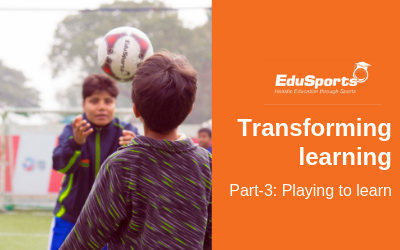“To succeed is to have failed” – learning from failures

Sports and the challenge of patronage.
Over the last 4 years of engaging with school leaders, parents, school coordinators, PE teachers, class teachers and school trustees on the challenge of getting kids to play in-school, there has been one consistent issue all along.
The king spots a talent, sponsors the talent and provides the facilities required for the talent to thrive. The talent gets a salary so that s/he can focus on the skill s/he is good at. Not sure if any talented sportsperson or artisan got rich through this method. But I guess it was a good way of earning a living and supporting your family.
In today’s world, the problem with sports and other performing arts – all labelled so nicely as “Co-scholastic” activities in the school system – is that they have historically thrived on royal patronage.
And in every discussion about the state of sports and arts in India, the discussion goes towards “The Government should implement so-and-so policies” “The Government should support the stars of India” etc.
In most countries across the world, the state provides the grounds, stadiums, parks, community recreational centers – and then private entrepreneurs run programs on that state-provided infrastructure. This is a key point as the opportunity cost of real estate does not enter the economics.
If a private player had to think about providing a large plot of land for a sports activity, the opportunity cost of building a large apartment complex would just kill the model.
Even the richest sports body in the world, the BCCI, uses government provided infrastructure. They do not have their own stadiums.
Society has never been able to promote sports without the state’s support. There are enough stories of “passing the hat around” during county cricket games – as a way of collecting some money for the players.
With the IPL, modern-day kings have appeared in the form of IPL Franchisees. This is seen across the world with people buying football clubs, basketball franchisees etc.
And again, the sport thrives because modern-day Rajas have patronised the game, funded the system, paid the players a lot of money and used the state-created sports infrastructure.
In the last 50-odd years, with all the bluster around NBA, NFL etc and now IPL, there is a whole industry around helping young kids make a career out of sport.
And that is where we have a design level flaw. Sports was meant to be played for the joy and fun of it. Now, it is being played because there is a career at the end of it.
Ask any successful sportsperson and s/he will tell you that s/he played for the love of the game. Never with a thought of turning pro. If it happens, great. If not, hey, I am enjoying the game.
The modern-day patronage in the form of professional clubs, franchisees etc is presenting a challenge to the original concept of sport. And taking the attention towards the “top-of-the-pyramid”, the best kids in sport. The kids who, by definition, are the top 0.01% of the population (wrt sporting abilities). And in the process, the remaining 99.99% are losing interest in sport. Because it is made to seem as if sport is not for them. It is only for the 0.01%.
Since the patronage (and the returns expected by the patrons) inherently works on the principle of peak performance, there is very little motivation towards getting all kids to play and develop through the sports experience.
Without confronting this challenge of patronage in sports & its resultant issues, we cannot move ahead on the point of a sporting culture, sporting nation etc.
For any sport or performing art to flourish on its own – without the patronage of the state or the modern-day Rajas, it has to make sense for the common man (rather, child) to engage in it. And hence, the benefits have to be such that they make sense for the child to engage in sport – and for the parent to encourage the engagement – even if there is no career in that field going ahead.
The health & fitness benefits, the social well-being and the all-rounded personality that develops through participation in sports are key benefits acknowledged by parents, employers, co-workers and society.
Those are the reasons most people ascribe to their “success” in adult or professional life. Not the marks they scored.
And hence it cannot be left to patronage. Or at the mercy of haphazard urban planning wherein playgrounds disappear as dumping lots or are never created.
The school system has to deliver the educational value of the sports experience. Every parent should demand a good sports experience for their child, especially if their child is not in the school team.
Only by demanding that an inclusive sports experience be an integral part of every child’s education can we fight off the challenge of patronage.







